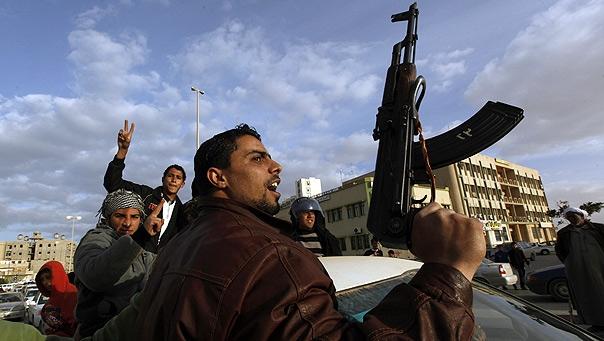As the smoke settles from weeks’ worth of gunfire in Tripoli, rebels opposing the ruling regime of Col. Moammar Gaddhafi finally had reason for celebration after storming his compound, Bab Al-Aziziya, on Aug. 23.
The civil war between Libyan rebel groups and Gaddhafi and his loyalists has been raging since February, and has been one of several uprisings in the Middle East, which have been collectively referred to as the “Arab Spring.”
The final capture of what had been the long-time nerve center of Gaddhafi’s dictatorship, Bab Al-Aziziya, marked a symbolic turning point in the Libyan struggle for freedom and reflected a turning point in the war for the rebels.
“Gaddhafi is basically finished,” said Human Rights Watch activist Bassam Bittar of the situation in Libya. “At this point the rebels are in control of 90 percent of Tripoli and have captured both of Gaddhafi’s sons, so it is safe to say that the revolution is drawing to a closing point.”
The conflict began in 1969, when Gaddhafi led a coup to overthrow then-Libyan ruler King Idris. Following the coup, Gaddhafi controlled Libya for the next 40 years in an authoritarian political system, which he referred to as “the world’s only democracy.”
Numerous internal and external sources, however, revealed the nation to be under one of the most corrupt dictatorships on Earth.
According to a classified State Department cable leaked in 2009, it was stated that “Libya is a kleptocracy in which the regime — either the Gaddhafi family itself or its close political allies — has a direct stake in anything worth buying, selling or owning.”
On Feb. 15, the Libyan rebellion was sparked when thousands of protestors took to the streets in several Libyan cities in response to the government’s arrest of Human Rights lawyer Fatih Terbil, Al Jazeera reports. As the rebellion movement gained strength, this widespread protest rapidly escalated into a civil war.
Since then, the opposing forces in Libya have been engaged in a near-constant struggle with one another, antagonized further by ongoing NATO airstrikes spread across Libya’s key population centers on the Mediterranean coast.
The Battle for Tripoli, which led up to the rebel takeover of Bab Al-Aziziya, began on Aug. 21 as rebels moved eastwards from the coastal city of Zawiya, according to the Atlanta Journal Constitution.
By the beginning of Aug. 22, Al Jazeera reported that the rebels were in control of 90 percent of Tripoli, including Green Square, the city’s nexus point. By 11:55 a.m. the next day, the BBC reported that the rebels had hoisted their flag over the Bab Al-Aziziya compound after hours of intense fighting marked by mortars, rockets, and small-arms fire.
Gaddhafi and his family, however, were nowhere to be found, and a Tripoli radio station had reported that he had fled from his headquarters in a “tactical move after his compound was leveled by 64 NATO air strikes.”
According to Libyan government spokesperson Moussa Ibrahim, Gaddhafi remains defiant of all calls for him to step down from power, vowing “resistance for months and years,” and saying he will turn Libya into “volcanoes, lava, and fire.”
Now, with the rebel takeover of Tripoli all but eminent, Al Jazeera reports that Gaddhafi may flee to Zimbabwe, where he maintains friendly relations with fellow dictator, Robert Mugabe. Such a move on the part of Gaddhafi remains questionable, however, and many observers are skeptical that he would consider fleeing the country that he had ruled for some 42 years.

